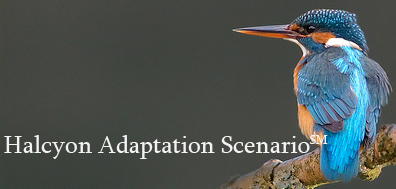
is a process through which communities can actively construct culturally sensitive, policy-relevant, scientifically informed and scale-appropriate environmental adaptation options. Why Halcyon? Follow this link for information on the word, the myth and the meaning behind halcyon.

![]() Begin the Halcyon Adaptation Scenario(SM) Process
Begin the Halcyon Adaptation Scenario(SM) Process
The Process
Integrating recent global research data together with local knowledge, this scenario development process equips participants to embark on positive social change through engaging in active inter- and transdisciplinary knowledge building activities and developing the capacity to apply that knowledge in decision change making from local to global -- and back again.
The Halcyon Adaptation Scenario(SM) can be used in rural or urban community environments, governmental contexts or classrooms as an on-the-ground capacity development process. It can also be used in a web-based format, engaging researchers or participants located anywhere on the globe.
The Future of Scenario Development is Now
While levels of process, analysis and outcomes are dependent upon the degree of participant knowledge and interaction, accessiblity of data and facilitator skills, basic to moderate training, mentoring and beginning scenario development processes can be accomplished using the web based process with self-guiding tutorials, semi-automated processes, and certified facilitators. A certification process for Halcyon Adaptation Scenario Facilitators will be available in the coming months.
Scenarios, historically used in strategic planning by using an array of factors (any of which are subject to considerable uncertainty) that influence policy performance, have primarily been used by experts to define possible futures for regions. An example of this method is the widely used Intergovernmental Panel on Climate Change (IPCC) AR4 scenarios for climate change that was published in 2007. The forthcoming AR5 report is changing it processes to reflect the growing body of knowledge and process requirements of those using data to make decisions. Notably, the AR5 is guided by consistent treatment and communication of uncertainty across working group topics; and while likelihood of occurances becomes more quantitative, confidence levels become more qualitative, synthesizing expert statements.
The Halcyon Adaptation Scenario(SM) process is responsive to this changing trend in global data and information, and integrates it into the emerging methods of "adaptive policy." This, we believe, is the future of scenario development - an inclusive, non-proscriptive process which requires access to data and tools for meaningful use by constiuencies from local communities to global multilateral or plurilateral environmental decision making processes.

